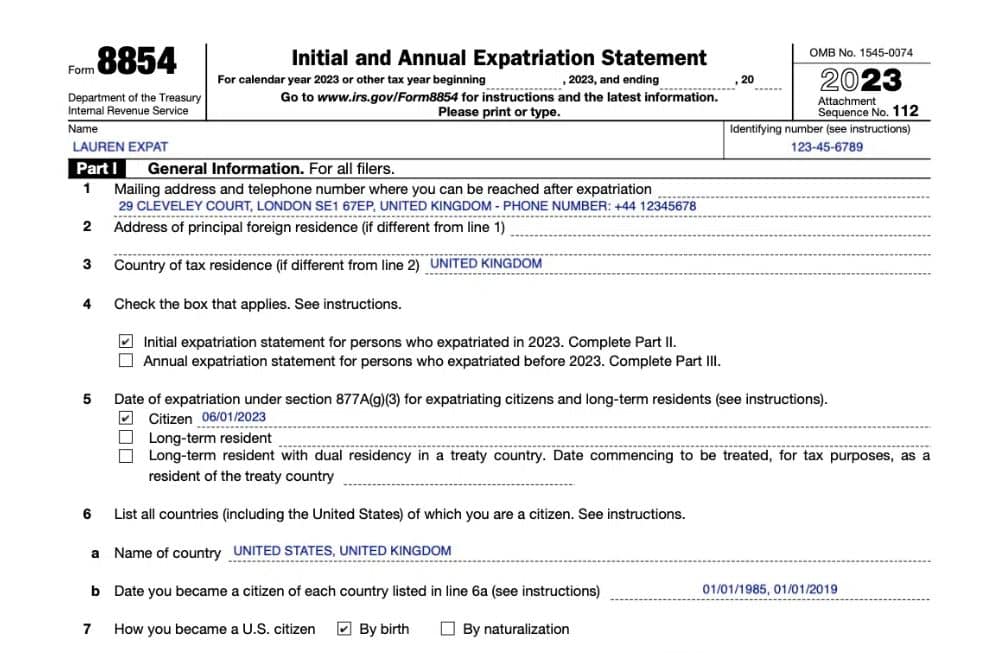Renouncing Your US Citizenship and Tax Implications for Expats

- How to Renounce Your US Citizenship
- How Much Does It Cost to Renounce US Citizenship?
- Tax Implications of Renouncing US Citizenship
- The Difference Between Covered and Non-Covered Expatriates
- Green Card Holders Beware
- Can I Get My US Citizenship Back after Renouncing It?
- Have Questions Regarding Renouncing Your US Citizenship? Get Reliable Help with Your Expat Taxes
Renouncing US citizenship is a significant and irreversible decision that carries substantial tax implications. This process, often considered by expatriates for various reasons, demands a thorough understanding of the US tax consequences associated with such a choice. It’s crucial to be fully informed about these implications to make a decision that aligns with your long-term personal and financial goals.
In this detailed guide, we focus on the essential tax-related considerations and consequences of renouncing US citizenship. From the exit tax, also known as the expatriation tax, to the intricacies of settling your final tax obligations with the IRS, we cover the key aspects that every individual should know before making this life-altering decision.
Key Takeaways
- The tax implications of renouncing your US citizenship can be a complicated and time-consuming process.
- The State Department charges a flat fee for renouncing US citizenship, which is currently $2,350. Depending on your tax status, you may also have to pay additional taxes when renouncing your citizenship.
- Renouncing US citizenship can trigger an Exit Tax under certain conditions. This tax applies if your net worth exceeds $2 million or your average annual net income tax for the past 5 years exceeds a specified threshold. It’s designed to tax the built-up wealth before exiting the US tax system
How to Renounce Your US Citizenship
The tax implications of renouncing your US citizenship can be a complicated and time-consuming process. To reach the finish line, you will need to:
- Obtain a non-US passport
- Fill out several forms
- Attend a renunciation appointment
- File a final tax return
Depending on your financial details, you may also need to pay the US exit tax. We’ll talk more about that below, but first, let’s take a closer look at the steps of renouncing your US citizenship.

Are You Ready to Move Abroad?
Choose the answer to each question that best describes you or your current situation, and learn how ready you are to start a life abroad.
Are You Ready to Move Abroad?
"*" indicates required fields

You have an adventurous spirit but you may need to prepare a bit more to ensure a smooth transition abroad. Consider researching more about the cultural, legal, and financial aspects of living overseas.
You’re on the right track. You’ve started to think about what life abroad will entail. Keep building on your preparations to avoid any surprises once you’ve moved.
You’re ready to move abroad! You seem well-prepared and have done your homework! You’re ready to embrace the expat life with confidence.
Step 1: Obtain a Non-US Passport
You can’t renounce US citizenship without a passport issued by a foreign country. Without a foreign passport, the State Department will deny your request. This is to ensure that you are not rendered “stateless,” which would make it virtually impossible for you to:
- Obtain a new passport
- Travel
- Rent or buy property
- Work
- Receive medical services
As you can see, not having a new country to call home would make life very difficult.
Step 2: Prepare the Relevant Forms
Once you have a foreign passport, it’s time to fill out the forms you will need for your renunciation appointment. The primary forms are:
- DS-4079: Request for Determination of Possible Loss of United States Nationality
- DS-4080: Oath of Renunciation of the Nationality of the United States
- DS-4081: Statement of Understanding Concerning the Consequences and Ramifications of Relinquishment or Renunciation of US Citizenship
- DS-4082: Witnesses’ Attestation Renunciation/Relinquishment of Citizenship
- DS-4083: Certificate of Loss of Nationality of the United States
You should fill out these forms before your renunciation appointment, but don’t sign them yet. The official who conducts your interview must witness you signing each form.
Step 3: Schedule a Renunciation Appointment
Next, you’ll have to schedule your renunciation appointment. This appointment must take place at a US embassy or consulate in a foreign country, and you must attend in person. Most expats choose an embassy or consulate in the country they intend to live in, but you can schedule your appointment in any country you’ve entered legally.
Bring all of the forms you already filled out (but haven’t signed yet) to your appointment. In addition to those, you will need several other documents, such as a foreign passport and a US birth certificate (if applicable).
When scheduling your appointment, double-check which documents you will need.
Step 4: Attend Your Renunciation Appointment
When you arrive for your renunciation appointment, an official will review your documents. They will also interview you to ensure you are acting voluntarily and understand the consequences of renouncing your citizenship.
If everything goes as planned, you will pay the renunciation fee and sign the various documents you’ve prepared. You will also sign an “oath of renunciation,” which finalizes your decision to renounce your US citizenship.
Step 5: File Your Final Tax Return
Even after signing an oath of renunciation, you will still be considered a US person for tax purposes until you file a final tax return using IRS Form 8854.
How Much Does It Cost to Renounce US Citizenship?
The State Department charges a flat fee for renouncing US citizenship, which is currently $2,350. Depending on your tax status, you may also have to pay additional taxes when renouncing your citizenship.
Tax Implications of Renouncing US Citizenship
Once you renounce your US citizenship, you will no longer be subject to US taxation. However, you will have to resolve any outstanding income tax debts first, and you may also have to pay the exit tax. Let’s look at some of the most common tax implications of renouncing US citizenship.
Outstanding Income Tax Debts
In order to renounce your citizenship, you must be tax-compliant for at least five years. This means that one must have the following:
- Filed an income tax return every year for the past five years
- Paid any tax debts you owe
If you haven’t filed a US tax return because you weren’t aware that this was required for Americans living abroad, don’t worry. The IRS offers an amnesty program called Streamlined Filing Compliance Procedures that may help some expats come into tax compliance depending on meeting the following requirements:
- Self-certify that you failed to file because of ignorance rather than willful refusal
- File your last three delinquent income tax returns and pay any taxes you owe (with interest)
- File a Report of Foreign Bank and Financial Account (also known as the FBAR) for each of the last six years
This will bring you into compliance with the IRS as a US citizen. However, to renounce your citizenship, you must show that you’ve filed tax returns for the past five years. This means you will need to file additional returns if you still haven’t met that standard after filing the three required by the Streamlined Filing Compliance Procedures.
Exit Tax
The exit tax is a tax that certain expats are required to pay when renouncing their citizenship. This tax is not a penalty. Instead, it’s a final bill for assets that haven’t been taxed yet, such as capital gains from homeownership or funds in a retirement account.
Calculating the exit tax can be complex. For most assets, the tax is calculated by treating your assets as if you had sold them at current fair market value, then taxing the unrealized capital gains accordingly. However, not all assets get this treatment, and the rules can be confusing.
We recommend always consulting an expat tax professional when calculating your exit tax liability. The penalties for getting the math wrong can be harsh.
The good news is that only expats deemed “covered expatriates” by the IRS are subject to the exit tax.
Expat Gift Tax
Being a covered expat can lead to more tax complications than the exit tax. It could impact your ability to give gifts to US citizens years after you’ve renounced your US citizenship.
Under US tax law, if a US person receives a gift from a covered expat exceeding the $17,000 annual exclusion, the gift is taxed at the highest gift tax rate (2023 Tax Year). This tax is imposed on the US person who receives the gift rather than the covered expat who gave it.
For example, let’s say Robert was a covered expat when he renounced his US citizenship and moved to Costa Rica. His daughter, Heather, lives in the US as a citizen. When Heather gets married, Robert wants to give her and her new spouse a gift of $50,000.
Because Robert is a covered expat, and because his gift exceeds the $17,000 annual gift tax exclusion, Heather will have to pay a 40% tax on her father’s gift to her.
Don’t Forget about potential Tax Issues after Expatriation
Renouncing doesn’t always get you completely out of the US tax system. If you still have income earned from the US, you’ll have to continue to file, but you will file Form 1040-NR (Non-Resident) after expatriation. Such income might include withdrawals from an IRA account or 401(k) account in the future. This would also include any income from rental property located in the US or for any business activities in the US. Typically, you would have to pay a flat tax of 30% on any interest, dividends, rental income, or similar types of investment income. If you don’t plan your expatriation carefully, then depending on your situation, you could wind up paying more in tax than if you had not renounced.
The Difference Between Covered and Non-Covered Expatriates
Knowing whether you qualify as a covered expat is essential in deciding whether renouncing your US citizenship makes sense. So what’s the difference between a covered expat and a non-covered expat?
In simple terms, the IRS will consider you a covered expatriate if any of the following standards apply:
- Your personal net worth exceeds $2 million
- Your average income liability over the past five years exceeds a set threshold of $190,000 for the 2023 tax year.
- You fail to indicate on Form 8854 that you’ve filed tax returns for the last five years.
If you meet these standards, you will be subject to the exit tax and the IRC 2801 expat gift tax.
Green Card Holders Beware
If you have lived in the United States long enough, then giving up your Green Card is considered expatriating, and you could be liable for the Exit tax. If you have lived “in” the US for 8 of the last 15 years, you are considered to have expatriated if you give up your Green Card. The word “in” is critically important, as living one day in any year is generally considered a full year for this purpose.
You also have to be careful when making tax treaty elections. Making an election before meeting the 8 years in the past 15 years rule means that you “stop the clock.” The year you make a tax treaty election does not count as a year in the US. However, if you have already met the 8 in 15 years rule, then making a treaty election is an act of expatriation that could result in having to pay an Exit tax whether you intend to renounce or not. Always be very careful with any treaty elections you make as a Green Card holder.
Can I Get My US Citizenship Back after Renouncing It?
You cannot get your citizenship back once you’ve renounced it; it’s impossible to regain it. The only exception to this is if you renounced your citizenship before the age of 18. In that case, you can regain your citizenship, but only if you contact the State Department within six months of your 18th birthday.
Have Questions Regarding Renouncing Your US Citizenship? Get Reliable Help with Your Expat Taxes
Have questions about the process or next steps? Contact us, and one of our Customer Champions will happily address all your concerns. We can even assist you in meeting your US tax obligations, regardless of whether you renounce your US citizenship.
If you’re ready to be matched with a Greenback accountant, click the get started button below.




